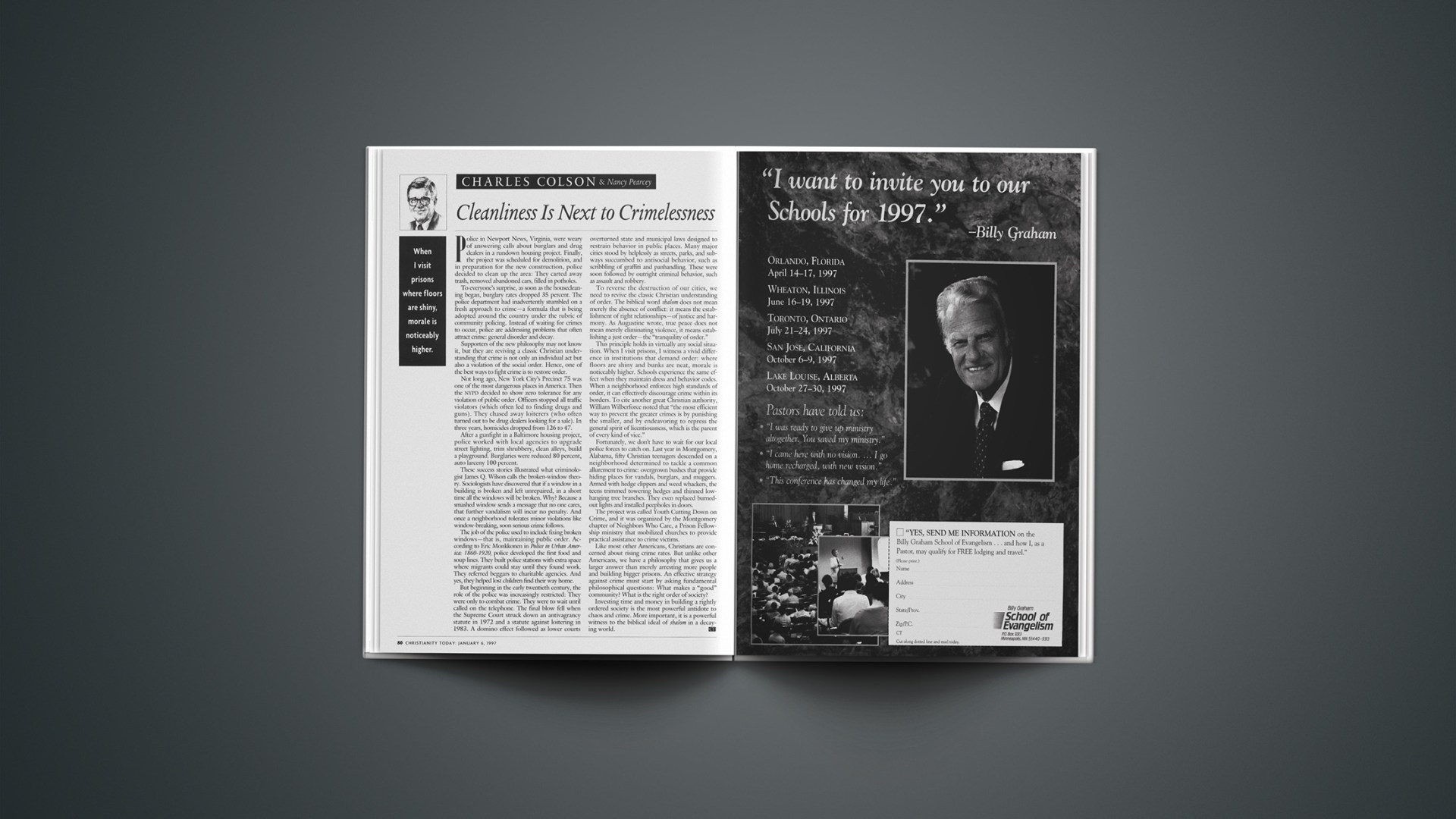Police in Newport News, Virginia, were weary of answering calls about burglars and drug dealers in a rundown housing project. Finally, the project was scheduled for demolition, and in preparation for the new construction, police decided to clean up the area: They carted away trash, removed abandoned cars, filled in potholes.
To everyone’s surprise, as soon as the housecleaning began, burglary rates dropped 35 percent. The police department had inadvertently stumbled on a fresh approach to crime—a formula that is being adopted around the country under the rubric of community policing. Instead of waiting for crimes to occur, police are addressing problems that often attract crime: general disorder and decay.
Supporters of the new philosophy may not know it, but they are reviving a classic Christian understanding that crime is not only an individual act but also a violation of the social order. Hence, one of the best ways to fight crime is to restore order.
Not long ago, New York City’s Precinct 75 was one of the most dangerous places in America. Then the NYPD decided to show zero tolerance for any violation of public order. Officers stopped all traffic violators (which often led to finding drugs and guns). They chased away loiterers (who often turned out to be drug dealers looking for a sale). In three years, homicides dropped from 126 to 47.
After a gunfight in a Baltimore housing project, police worked with local agencies to upgrade street lighting, trim shrubbery, clean alleys, build a playground. Burglaries were reduced 80 percent, auto larceny 100 percent.
These success stories illustrated what criminologist James Q. Wilson calls the broken-window theory. Sociologists have discovered that if a window in a building is broken and left unrepaired, in a short time all the windows will be broken. Why? Because a smashed window sends a message that no one cares, that further vandalism will incur no penalty. And once a neighborhood tolerates minor violations like window-breaking, soon serious crime follows.
The job of the police used to include fixing broken windows—that is, maintaining public order. According to Eric Monkkonen in Police in Urban America: 1860-1920, police developed the first food and soup lines. They built police stations with extra space where migrants could stay until they found work. They referred beggars to charitable agencies. And yes, they helped lost children find their way home.
But beginning in the early twentieth century, the role of the police was increasingly restricted: They were only to combat crime. They were to wait until called on the telephone. The final blow fell when the Supreme Court struck down an antivagrancy statute in 1972 and a statute against loitering in 1983. A domino effect followed as lower courts overturned state and municipal laws designed to restrain behavior in public places. Many major cities stood by helplessly as streets, parks, and subways succumbed to antisocial behavior, such as scribbling of graffiti and panhandling. These were soon followed by outright criminal behavior, such as assault and robbery.
To reverse the destruction of our cities, we need to revive the classic Christian understanding of order. The biblical word shalom does not mean merely the absence of conflict: it means the establishment of right relationships—of justice and harmony. As Augustine wrote, true peace does not mean merely eliminating violence, it means establishing a just order—the “tranquility of order.”
This principle holds in virtually any social situation. When I visit prisons, I witness a vivid difference in institutions that demand order: where floors are shiny and bunks are neat, morale is noticeably higher. Schools experience the same effect when they maintain dress and behavior codes. When a neighborhood enforces high standards of order, it can effectively discourage crime within its borders. To cite another great Christian authority, William Wilberforce noted that “the most efficient way to prevent the greater crimes is by punishing the smaller, and by endeavoring to repress the general spirit of licentiousness, which is the parent of every kind of vice.”
Fortunately, we don’t have to wait for our local police forces to catch on. Last year in Montgomery, Alabama, fifty Christian teenagers descended on a neighborhood determined to tackle a common allurement to crime: overgrown bushes that provide hiding places for vandals, burglars, and muggers. Armed with hedge clippers and weed whackers, the teens trimmed towering hedges and thinned low-hanging tree branches. They even replaced burned-out lights and installed peepholes in doors.
The project was called Youth Cutting Down on Crime, and it was organized by the Montgomery chapter of Neighbors Who Care, a Prison Fellowship ministry that mobilized churches to provide practical assistance to crime victims.
Like most other Americans, Christians are concerned about rising crime rates. But unlike other Americans, we have a philosophy that gives us a larger answer than merely arresting more people and building bigger prisons. An effective strategy against crime must start by asking fundamental philosophical questions: What makes a “good” community? What is the right order of society?
Investing time and money in building a rightly ordered society is the most powerful antidote to chaos and crime. More important, it is a powerful witness to the biblical ideal of shalom in a decaying world.
Copyright © 1997 Christianity Today. Click for reprint information.










